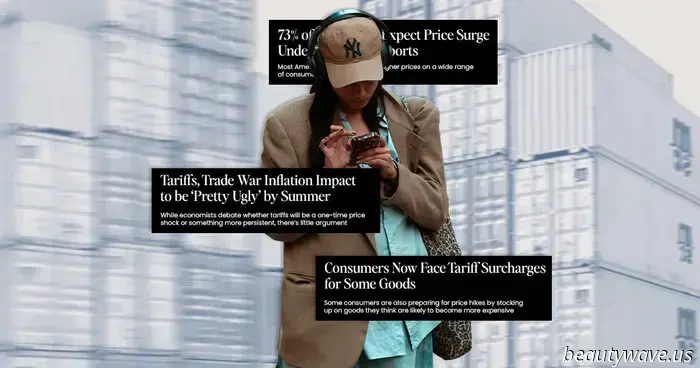
We Consulted Experts: What Impact Will the Tariffs Have on Your Finances?
Perhaps it's just my perception, but it seems like each purchase I make carries a significant cost. With an increasing cost of living and rising bills, it feels like simply maintaining financial stability—let alone progressing—is an unattainable goal, even for the most financially astute individuals. To complicate matters further, President Trump introduced a series of new tariffs last week, plunging the market and global economy into a tumultuous phase of uncertainty. Although these tariffs have now been paused, a baseline tariff of 10 percent remains. This back-and-forth only exacerbates my concerns about the economy and has heightened my financial anxieties.
This situation prompted me to contemplate: How will President Trump's tariffs affect my finances if they are reinstated? To address this crucial query, I consulted four financial experts. Below are their insights and essential information on how tariffs may influence your finances going forward.
### Experts Consulted
**MEET THE EXPERT**
Courtney Alev, Associate Director of Product Management at Credit Karma
Courtney Alev holds the position of Consumer Financial Advocate at Credit Karma, alongside her role as Associate Director of Product Management. In this capacity, she is tasked with developing the next generation of product features aimed at helping members understand, grow, and secure their wealth.
**MEET THE EXPERT**
Donna Deaton, Realtor
Donna Deaton has been a full-time realtor since 2003 and serves as the Vice President of RE/MAX Victory + Affiliates. She has a passion for helping others realize their dreams and is well-versed in all aspects of residential real estate.
**MEET THE EXPERT**
Laura Mattia, CFP®, MBA, Ph.D., Senior Vice President, Financial Advisor
Laura began her financial industry career over three decades ago, ascending to roles like Controller and CFO before pursuing personal financial planning. In 2020, she established Atlas Fiduciary Financial and joined Wealth Enhancement in 2024. She authored the book "Gender on Wall Street: Uncovering Opportunity For Women In Financial Services," hosts the "Money Matriarchs" podcast, and contributes to various media outlets including The Wall Street Journal, Bloomberg, CNBC, MarketWatch, USA Today, Investment News, MSN, and ABC News.
**MEET THE EXPERT**
Ayako Yoshioka, Portfolio Consulting Director at Wealth Enhancement Group
Ayako began her career in Institutional Client Relations and Marketing before advancing to a Portfolio Analyst role, overseeing portfolio trading and compliance for over $4 billion in equity securities. She then worked as a Research Analyst, covering various sectors and advising portfolio managers. Currently, as a Portfolio Consulting Director at Wealth Enhancement Group, Ayako offers her expertise in research and investment analysis across multiple asset classes to support advisors and clients in portfolio development.
### What Are Tariffs and Why Is This Relevant Now?
In essence, tariffs are taxes imposed on imported goods. This common practice is intended to help countries stimulate their own economies by protecting local industries and generating government revenue. President Trump asserts that tariffs are designed to address a trade deficit and enhance economic growth.
Economists are divided on the efficacy of Trump's tariffs, with some claiming they could be detrimental to U.S. jobs and industries. Regardless of that discussion, the tariffs are raising alarms regarding the potential for a recession. While negotiations are ongoing, as of April 9, 2025, a minimum tariff of 10 percent applies to goods imported from every country except China, which is facing a tariff of 145 percent. To provide context, the average global tariff hasn't hit 10 percent since 1943.
Consequently, imported goods are now subject to higher tax rates, leading to increased prices for consumers and a higher cost of living.
### How Tariffs Will Affect Your Personal Finances
1. **Increased Costs for Everyday Imported Goods**
There's a clear reason behind the rising prices of everyday essentials like groceries and utilities. Tariffs can trigger an economic domino effect for consumers. According to Courtney Alev, businesses might opt to pass on the costs of tariffs to consumers to preserve profit margins, resulting in higher prices. While it's tough to predict specific impacts, items such as electronics, cars, alcohol, clothing, shoes, and furniture are likely to encounter significant price hikes based on their countries of import. Ultimately, Ayako Yoshioka emphasizes that the extent of these increases will hinge on final negotiated tariff rates and how much companies choose to absorb or transfer to consumers.
2. **Potential Rent Increases**
Regrettably, the outlook for the housing market appears bleak. Donna Deaton predicts that tariffs will likely worsen supply and demand challenges. Uncertainty around interest rates is already deterring homeowners from selling, and if tariffs raise the costs of developing and constructing properties, fewer housing options may become available. This constrained supply could lead to higher rent prices, with Deaton noting that rental property owners will struggle to keep rents low due to increased construction and renovation expenses.
3. **





Other articles
 I reside in Athlesiure—Here’s How I Discover the Best Items Without Exhausting My Entire Salary.
Reminder: high quality doesn’t have to cost over $100!
I reside in Athlesiure—Here’s How I Discover the Best Items Without Exhausting My Entire Salary.
Reminder: high quality doesn’t have to cost over $100!
 How Content Creator Tennille Jenkins Keeps Reinventing Herself
The Second Life podcast features an interview with content creator Tennille Jenkins.
How Content Creator Tennille Jenkins Keeps Reinventing Herself
The Second Life podcast features an interview with content creator Tennille Jenkins.
 H&M's concert in L.A. featured the best-dressed guests—check out all the outfits I noted down.
H&M just hosted the season's most spectacular concert, and as expected, attendees arrived in their finest attire. You can shop their exact outfits here.
H&M's concert in L.A. featured the best-dressed guests—check out all the outfits I noted down.
H&M just hosted the season's most spectacular concert, and as expected, attendees arrived in their finest attire. You can shop their exact outfits here.
 Envisioning Girlhood with Zaya Wade
Who What Wear spoke with the 17-year-old model and activist a few months prior to her college departure to discuss fashion, her project Translatable, and her fascination with knee-high boots.
Envisioning Girlhood with Zaya Wade
Who What Wear spoke with the 17-year-old model and activist a few months prior to her college departure to discuss fashion, her project Translatable, and her fascination with knee-high boots.
 Is Laser Hair Removal Permanent? My Results After 3 Years & What to Anticipate
my armpits ???? LaserAway
Is Laser Hair Removal Permanent? My Results After 3 Years & What to Anticipate
my armpits ???? LaserAway
 From Coach to Louis Vuitton, Discover the Most Stylish Outfits from the 2025 WNBA Draft.
Broadcasting from New York.
From Coach to Louis Vuitton, Discover the Most Stylish Outfits from the 2025 WNBA Draft.
Broadcasting from New York.
We Consulted Experts: What Impact Will the Tariffs Have on Your Finances?
We consulted four experts to explain how the recently implemented (and then suspended) tariffs will impact your finances.
